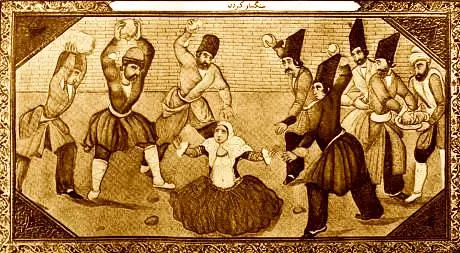I want to look at stoning in Judaism as a quick case study of how concepts evolve in religions as their practitioners mature morally.

- Early Hebrew Bible: You can get stoned for anything (there’s about 22 capital crimes, although stoning itself only applies to some). The procedure’s an extremely brutal way to die (if you want to make sure you’ll never be complacent the horror of stoning, look up Du’a Khalil Aswad).
- Late Hebrew Bible: When Nehemiah arrives in Jerusalem as the new the Jewish community leader, he catches a lot of them breaking the Sabbath. This carries the penalty of stoning, but instead, he just tells them off (Neh 13:15-21). Now, Nehemiah’s not a very pleasant character but you can’t deny there’s been some progress.
- Early Rabbinic Judaism: In the rabbis’ interpretation, all capital cases require a warning before the act and 2 kosher witnesses. There are heaps of exclusions for each capital case that make conviction itself very unlikely. A court that executes 1 person in 7 years is considered bloodthirsty (Makkot 1:10). The rabbinic law for the procedure is to push the victim off a mound twice the height of a man (so he’d have a chance to die from the fall). Then a large stone is dropped on the heart, presumably to bring a quicker death (Sanhedrin 6:4). Not a picnic but I’d prefer this version. Note: the rabbis legislated virtually the entire death penalty out of existence, all within their religious framework.
- Later Rabbinic Judaism: Further rules on capital punishment were developed, the most important being that the person is given a goblet of wine with frankincense to numb the senses — the best anesthesia available then (Sanhedrin 43a).
- Modern Judaism: There probably hasn’t been a capital case tried in 2000 years. It’s considered put off until the messiah comes, so ’twill be a while… But note that if people really wanted to reinstate it, they would have. Just like the supposed Orthodox yearning for the return of Temple sacrifices that’s probably a sham, it seems nobody actually wants a rabbinnic court that tries capital cases.
 According to Judaism, the Talmud merely gives details of how God always intended the laws to be interpreted. Hence, Orthodox Jews often don’t understand talk about the “brutality of the Torah”. Much of it’s been softened beyond recognition by Rabbinic tradition. But a simpler explanation for the new laws (that doesn’t presuppose that divinity of the Bible/Talmud) is that the rabbis simply didn’t want to execute anyone — so they took some liberties within the system. And the simplest explanation for Nehemiah not executing the sabbath-breakers is that it was no longer part of his moral reality.
According to Judaism, the Talmud merely gives details of how God always intended the laws to be interpreted. Hence, Orthodox Jews often don’t understand talk about the “brutality of the Torah”. Much of it’s been softened beyond recognition by Rabbinic tradition. But a simpler explanation for the new laws (that doesn’t presuppose that divinity of the Bible/Talmud) is that the rabbis simply didn’t want to execute anyone — so they took some liberties within the system. And the simplest explanation for Nehemiah not executing the sabbath-breakers is that it was no longer part of his moral reality.
Dan Dennett says that we should tolerate (maybe even encourage) non-toxic versions of religion in order to push the toxic versions out. If he’s right, maybe there is something that can be done to help grease the wheels of such progress. Kinda like a detox program for religions (except one that works).
In Iran you can be killed for having gay sex. But the Ayatollah himself considered transgender operations to be ok. Transsexuality is stigmatised but legal, all within the Sharia framework. Apparently Qom (the Vatican of Shia Islam) is the place to be for pre-op transsexuals.
We have great capacity for self-delusion. If we want to change something, even in a system as closed as religion, no amount of Leviticuses will stop us. We just need the desire. Alas, the pace of such progre





0 Comments